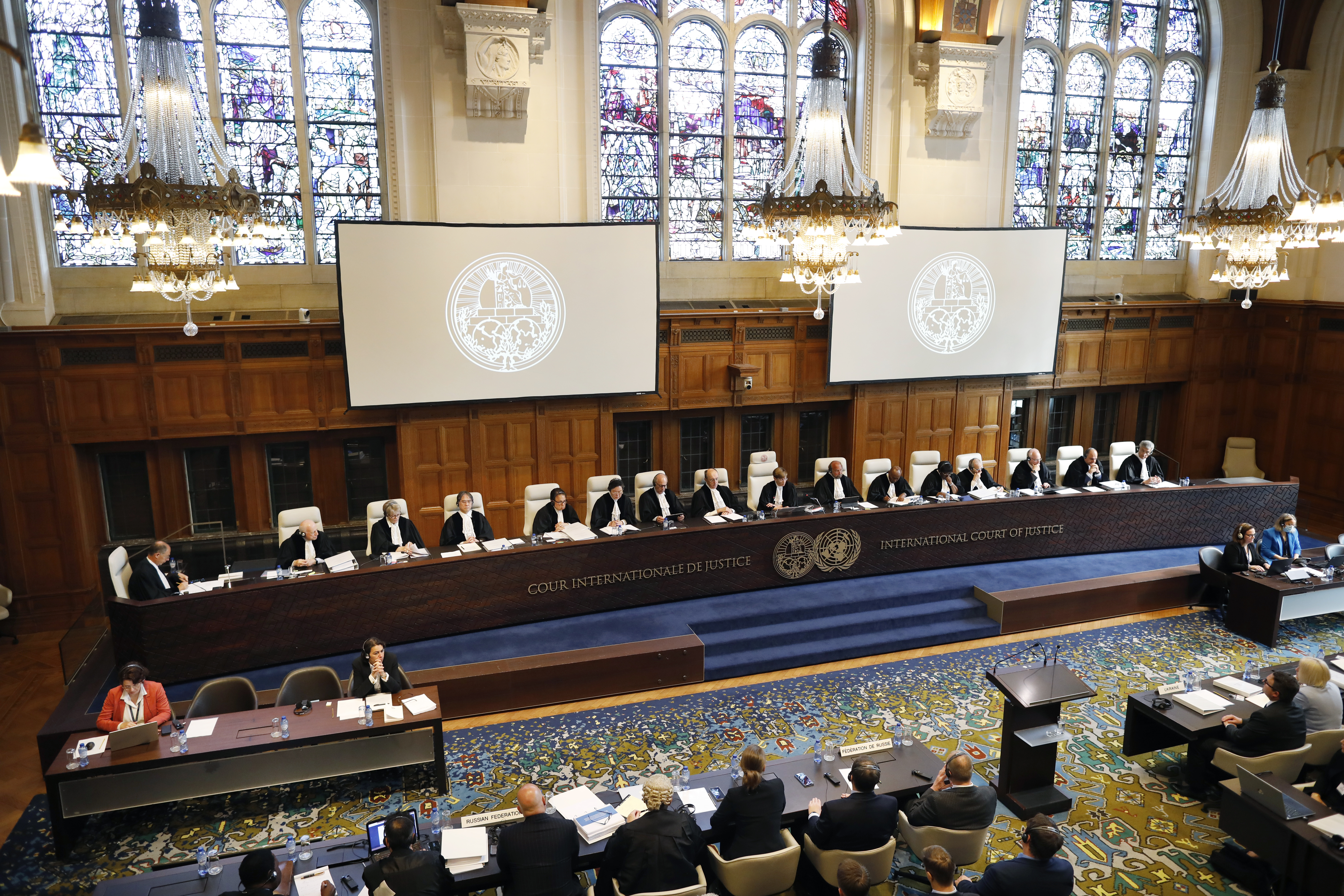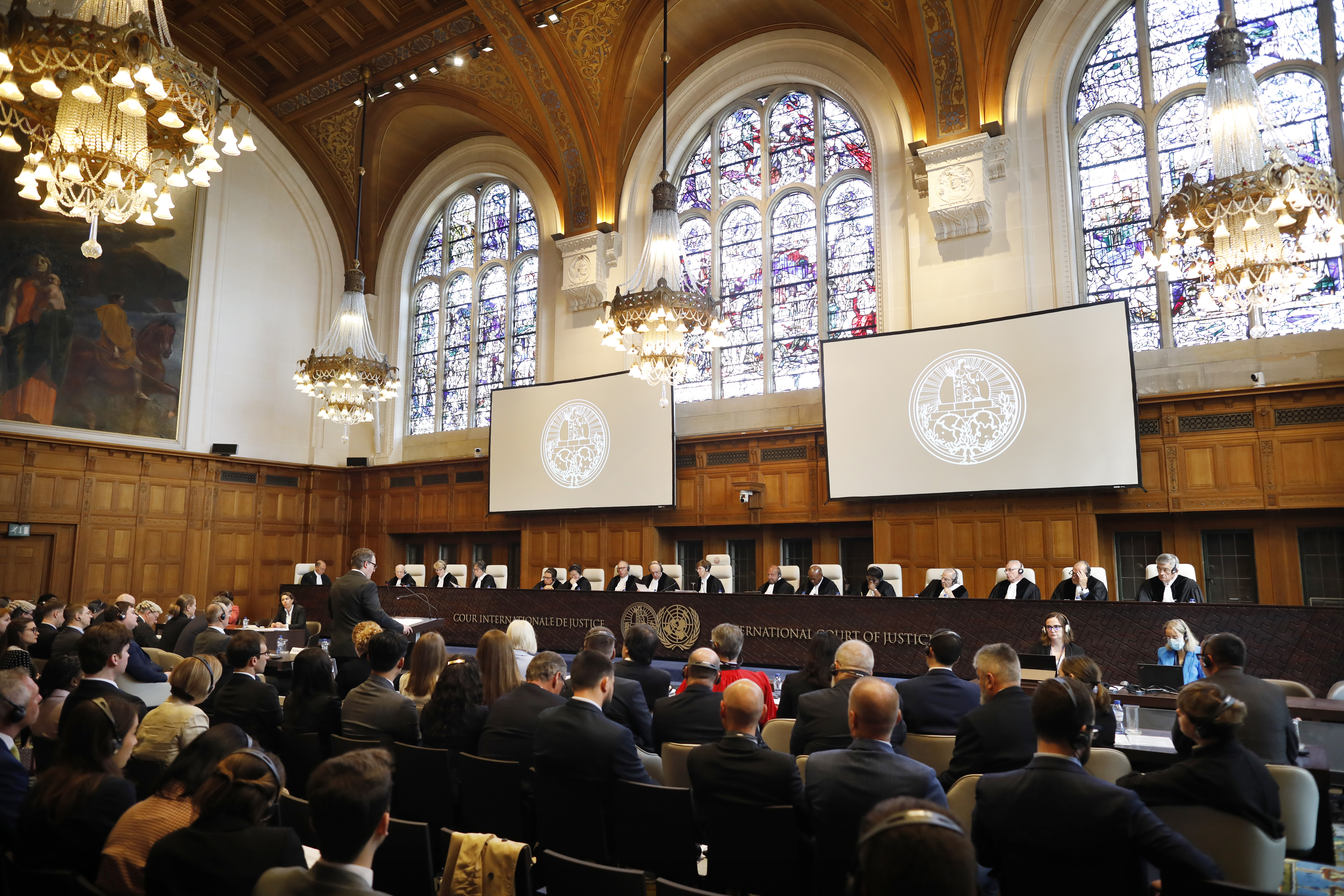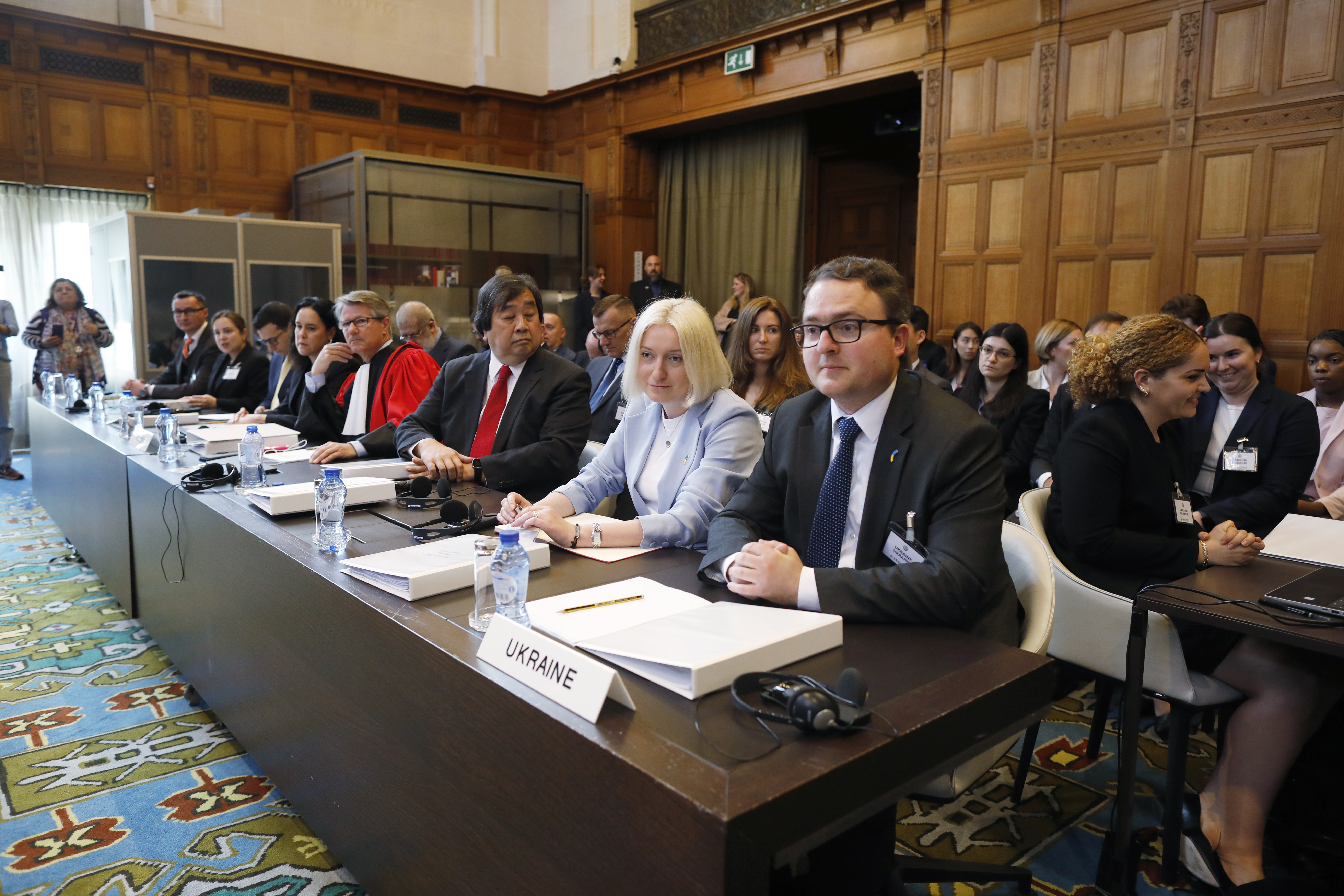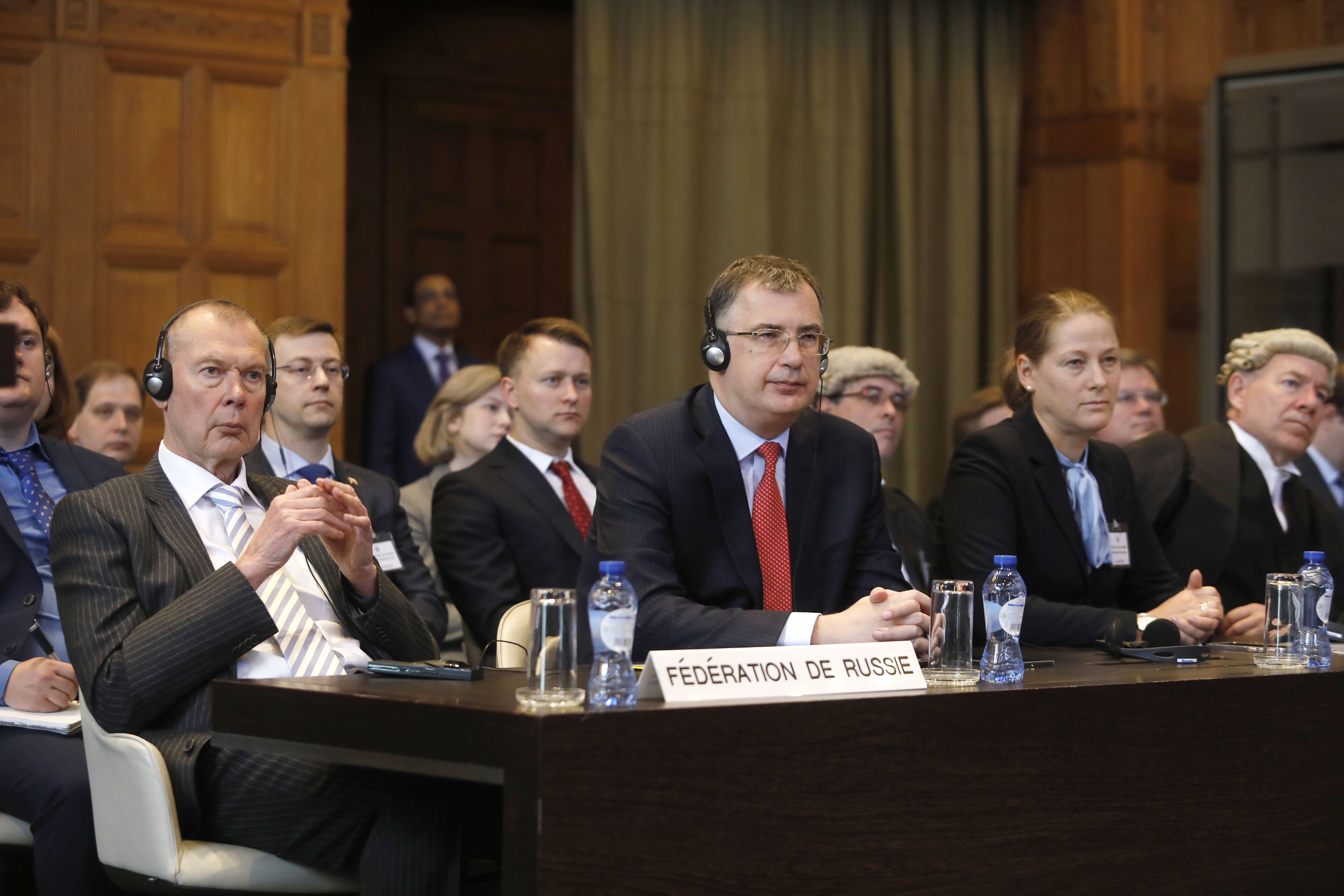tijd
in
flight_mh17
Слово Гааге

Международный суд ООН в Гааге заслушивает показания сторон в деле по иску Украины к России о нарушении Конвенций о борьбе с терроризмом и геноцидом. Такие дела движутся медленно. Иск был подан в январе 2017 и официально принят к рассмотрению в ноябре 2019.
В марте 2022 предварительным решением суд обязал Россию прекратить агрессию - решение было проигнорировано https://www.icj-cij.org/public/files/case-related/182/182-20220316-ORD-01-00-EN.pdf
Правила позволяют третьим странам официально поддержать одну из сторон. 33 страны выразили желание поддержать Украину. Суд принял обращение от 32 из них, среди которых все страны Евросоюза кроме орбановской Венгрии, а также Австралия, Великобритания, Канада, Лихтенштейн, Новая Зеландия и Норвегия. США было отказано по техническим причинам https://www.icj-cij.org/sites/default/files/case-related/182/182-20230609-PRE-01-00-EN.pdf

Публичные слушания проходят в два этапа https://www.icj-cij.org/sites/default/files/case-related/166/166-20230516-PRE-01-00-EN.pdf
6 июня 2023 - Украина
8 июня 2023 - Россия
12 июня 2023 - Украина
14 июня 2023 - Россия
Видеотрансляции здесь: https://www.icj-cij.org/multimedia/202740
Протоколы заседаний здесь: https://www.icj-cij.org/case/166

Украинскую команду в суде возглавляет Антон Кориневич, посол по особым поручениям МИД, его заместитель - Оксана Золотарева, директор Департамента международного права МИД.
Из выступления Кориневича:
"Flight MH17. Volnovakha. Mariupol. Kramatorsk. Kharkiv. Civilians faced a reign of intimidation and terror. Now Russia brings terror to all the citizens of Ukraine on a national scale. In every city I just mentioned, Russia has committed larger atrocities. Mariupol, recently the most vibrant city in the Azov region, turned into ruins. Volnovakha, a quiet town, smashed to nothing. Large portions of Kharkiv, called the students’ capital of Ukraine, levelled. New cities have been added to this list: Horrifying massacres in Bucha, torture chambers in Kherson, mass graves in Izyum and so much more. <…>
Russia’s actions are the actions of a terrorist state, an aggressor. But such actions did not appear out of the blue. They are the tragic but logical outcome of the situation we brought to this Court’s attention back in 2017. Russia shall face accountability for the crimes of the present. But today, we focus on the recent past. We will not let new atrocities cloud the memories of past victims. As Russia assaults the idea of a Ukrainian people, we will not forget Russia’s attack on the Ukrainians and Crimean Tatars in Crimea. As the death toll mounts, and Russian missiles fall on our cities, we will not forget the civilians who perished in the deadly winter of 2015, sacrificed for the political agenda of Russia’s proxies. Ukraine brings claims under two treaties, but this is one case. It is about the choice the Ukrainian people made in our Revolution of Dignity of 2014, to chart the path to a European future; the Orange Revolution of 2004, to have free and fair elections; and, ultimately, the Revolution on Granite of 1990, to live independently from the orders of Moscow. This case, and the treaty violations that flow from it, arise from Russia’s refusal to accept our free choices. Russia’s tactics are flexible. Where it could occupy Ukrainian territory, it imposed discrimination. Where it could not, Russian officials fuelled terror. As a result, Russia violated two different treaties - the Convention on the Elimination of All Forms of Racial Discrimination, or CERD, and the International Convention for the Suppression of the Financing of Terrorism, or the ICSFT. But Russia’s violations are variations on the same theme."
Случай MH17 подробно разобрал на суде адвокат Дэвид Зионтс из адвокатской компании Covington & Burling, которая считается лучшей в Вашингтоне.
"Firing a weapon that is incapable of distinguishing military from civilian targets, into civilian-trafficked airspace, establishes intent to destroy a civilian target. The capabilities and practical operation of the Buk system are explained in the testimony of Dr Anatolii Skorik, a colonel and professor at Kharkiv Air Force University. I would like to acknowledge that Dr Skorik has taken time from his important responsibilities in Ukraine to be here today. Dr Skorik explains that Buk operations are normally carried out under the direction of a combat control centre. A single TELAR can operate autonomously, but with severe limitations. In autonomous mode, a commander must make firing decisions on the basis of the TELAR’s sparse indicator screens and friend-or-foe system. This system, however, only identifies allied military aircraft as “friends”; everyone else, military or civilian, is marked as a “foe”. The aiming screen provides information about a target’s location and general parameters - but not enough information to tell a civilian plane from a military plane. Dr Skorik therefore concludes: “The technical capabilities of the Buk-M1 TELAR in autonomous mode do not make it possible to distinguish a civilian aircraft from a military one, and this situation is further exacerbated under highly stressful conditions experienced by the combat crew.” Dr Skorik’s conclusion is shared by the Government of the Netherlands: “The Buk system was not capable of distinguishing between enemy military aircraft and civilian aircraft.” <…>
Under Article 18 of the ICSFT, Russia had an obligation to take practicable measures to prevent terrorism financing. It would have been practicable for Russia to instruct its officials not to supply the DPR with weapons, and at the very least not to supply a partial system unable to distinguish civilian from military targets. But Russia did nothing of the sort. Russia also could have policed the border. On 24 May 2014, the State border guard of Ukraine sent one of many requests to the Russian border guard. Ukraine urged, in the interest of safeguarding civilians specifically, that Russia urgently implement measures to stop the smuggling of weapons across the border. Russia ignored that plea. It did not even respond until months after the destruction of Flight MH17. And then the Russian border guard deflected responsibility, making a bizarre claim that it had no authority to address “the passage of vehicles transporting cargo”127. That is, Russia’s border guard disclaimed authority to guard Russia’s border. Had Russia answered Ukraine’s call to co-operate in good faith, no Buk-TELAR could have entered Ukraine on 16 July 2014. In legal terms, this practicable measure could have prevented an Article 2 offence. In human terms, 298 people would still be alive. The three infants on board would be 9 years old today. These were preventable deaths. Russia could have prevented them. After those deaths, Ukraine confronted Russia with allegations that the supply of the Buk constituted an Article 2 offence. Article 9 of the ICSFT required Russia to investigate that allegation in good faith. Article 10 required Russia to prosecute or extradite the perpetrators. Instead, Russia obstructed multilateral efforts to investigate and prosecute those responsible. Most brazenly, this past February, President Putin bestowed on the 53rd Anti-Aircraft Brigade the honorary title of “Guards” for their “mass heroism and valor”. That is how Russia responds when its own officials finance terrorism and cause mass civilian destruction - not co-operation, not prevention, not investigation, not punishment. Instead, high honours. That is not the act of a State that takes its obligations under the Convention seriously."

Российскую команду возглавляют Геннадий Кузьмин, посол по особым поручениям МИД, и Александр Шульгин, посол в Нидерландах.
Из выступления Кузьмина:
"At the end of the day, Ukraine’s MH17 case boils down to nonsense, that it is lawful and unintentional for soldiers to shoot down civilian aircraft by mistake during peace time, but unlawful, intentional and a terrorist act to do so during a time of war, while believing the target to be an enemy military aircraft. This contradicts not only the black letter of the relevant instruments, but also the interpretation of the competent international bodies, the views of legal scholars and extensive State practice - all of which indicates that a mistaken downing of a civilian aircraft in time of war negates intent for the purposes of terrorism or war crime."
Мысль о "nonsense" развил дорогой британский адвокат Майкл Суэйнстон. Во-первых, сбитие гражданского самолета из Бука - это не терроризм. А во-вторых, никакого Бука не было.
"Ukraine relies on a mistake, a mistake of targeting in relation to MH17. Ukraine relies on alleged shelling and bombing in the course of an armed conflict. But injury in armed conflict to civilians is inevitable. It does not point to terrorism. <…>
Please understand that Russia absolutely rejects all of this case. There was no Russian Buk. No Buk came from Russia. No crew for a Buk came from Russia. And we will see later that the evidence propping up this case is unsourced digital nonsense."
Продолжим следить за выступлениями сторон на этой неделе.
WATCH LIVE: Ukraine opens the second round of oral argument in the case #Ukraine v. #Russia before the #ICJ https://t.co/NRCfT2rKB6
- CIJ_ICJ (@CIJ_ICJ) June 12, 2023